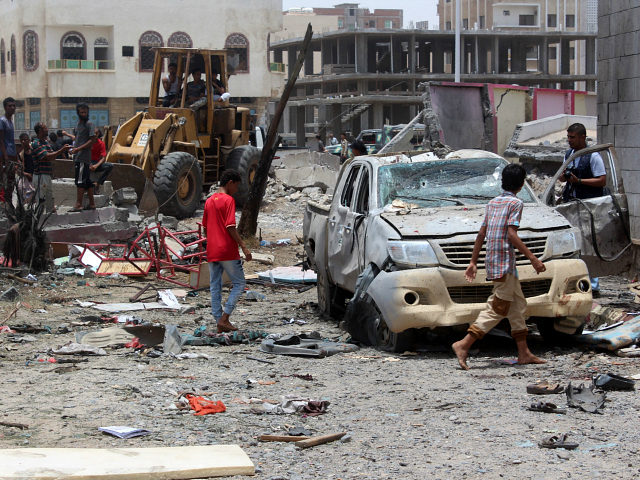The Islamic State has claimed responsibility for two suicide bombings in Yemen and Iraq Monday, killing more than 70 people.
One bomber drove his pick-up truck into a crowd of people at a training camp in Aden, in southern Yemen, blowing himself up and killing at least 54 pro-government fighters and wounding another 70. Claiming the attack, ISIS stated that “60 people were killed in a militia recruitment center” in what was one of the deadliest massacres perpetrated to date by the terror group in Yemen.
Meanwhile, in Kerbala, Iraq, five ISIS militants attacked a wedding celebration late Sunday night, firing machine guns and throwing hand grenades, with one of the assailants reportedly blowing himself up. Security forces managed to kill the other jihadis but not before they had killed at least 18 people and wounded another 26. The attack took place in the village of Ein Tamer, to the south of Baghdad.
The Yemen bombing took place Monday morning around 8:00 a.m. local time, when the training area, which is near two schools and a mosque, was full of people.
“Bodies and body parts are scattered all over the place,” said eyewitness Mohammed Osman. “It was a massacre.”
According to reports, the Yemen bomber was one Ahmed Seif, who is pictured smiling in a photo and holding an assault rifle near a rocket grenade launcher with a flag used by Islamic radicals.
ISIS forces have often targeted security and government installations in Aden, the capital of the internationally recognized government of President Abed Rabbo Mansour Hadi.
The slain pro-government troops were reportedly preparing to leave for Saudi Arabia to fight in the northern border area of Yemen.
For 17 months, Yemen has been the scene of a civil war between a government recognized by the international community and supported by an international coalition led by the Saudis and Shiite rebels known as Houthis and army units loyal to a former president.
The armed conflict began in March of 2015 when Saudi Arabia gathered a coalition to combat the Houthis after they took over the capital city of Sana’a.
Monday’s attack came amid a fresh drive to end the war that has left 6,600 people dead, according to the United Nations, and displaced another 2.5 million Yemenis.
Follow Thomas D. Williams on Twitter Follow @tdwilliamsrome.

COMMENTS
Please let us know if you're having issues with commenting.